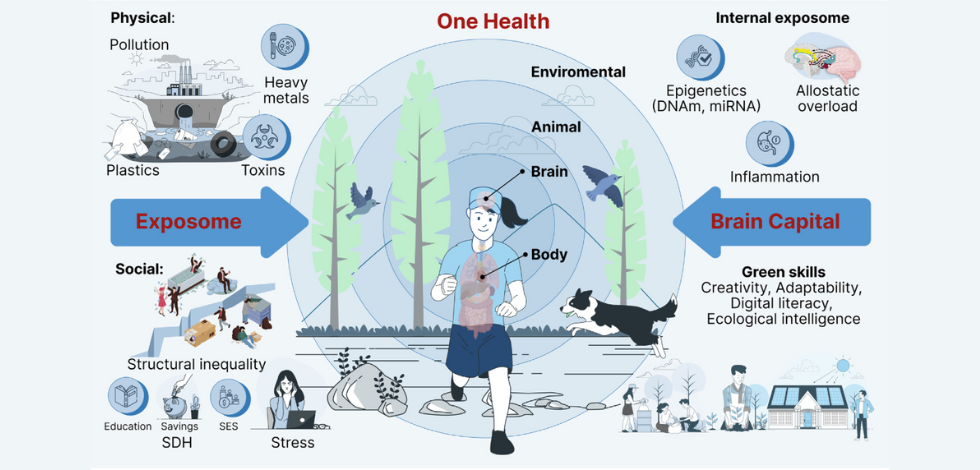El ser humano está inmerso en un mundo lleno de interacciones de diferentes orígenes y efectos, lo que inevitablemente nos influye. En este contexto, surgen conceptos como el exposoma, que se refiere al conjunto de factores a los que una persona está expuesta a lo largo de su vida; el enfoque One Health, que reconoce la estrecha relación entre la salud humana, la de otras especies y la del medio ambiente; y el capital cerebral, que comprende nuestras habilidades cognitivas y psicológicas como un factor crucial para el desarrollo individual y social.
Este análisis se lleva a cabo en un estudio titulado “Neuroecological links of the exposome and One Health” (“Vínculos neuroecológicos del exposoma y la Salud Única”) liderado por Agustín Ibáñez, con el respaldo de investigadores como Claudia Duran-Aniotz y Harris Eyre, también del Instituto BrainLat, junto con un equipo internacional de investigadores y colaboradores. Publicado en la prestigiosa revista Neuron, el estudio no sólo explora los conceptos mencionados, sino que profundiza en su importancia como herramientas para comprender nuestra salud y propone estrategias para mejorarla.
El estudio subraya la necesidad de un enfoque holístico e integrador para comprender la salud en su totalidad, conectándola con nuestro entorno y reconociendo la importancia fundamental de este para nuestro bienestar. Además, se analiza la relevancia de nuestras propias habilidades, como las cognitivas, para generar y mantener estos equilibrios, y cómo estas capacidades pasan a formar parte de nuestro «capital», relacionando así nuestro bienestar con aspectos incluso económicos.
Uno de los aspectos destacados del estudio es la influencia del ambiente, especialmente los contaminantes presentes en él. Como menciona Agustín, «Los hallazgos revelan que contaminantes como la materia particulada fina, metales pesados y factores sociales como el estrés y la desigualdad tienen profundas implicaciones para la salud cerebral a lo largo de toda la vida». Estos contaminantes y factores estresantes afectan en diferentes etapas de la vida, desde el desarrollo neurológico en la juventud hasta el desarrollo de enfermedades neurodegenerativas en la edad adulta.
Al comprender la interdependencia entre nuestra salud y el estado del entorno, se hace evidente la necesidad de estrategias bien definidas. Los investigadores proponen una serie de medidas, desde el monitoreo del entorno hasta la integración del exposoma en las políticas públicas.
Como señala Eyre, «El artículo nos proporciona una sólida plataforma de política científica y tecnológica que nos lleva hacia nuestro evento en la Cumbre Científica de la Asamblea General de las Naciones Unidas el 18 de septiembre de 2024 sobre este tema», destacando así la importancia del estudio en el ámbito político y científico.
Abordar a la especie humana como un elemento integrado en un complejo entramado de interconexiones es fundamental para catalizar transformaciones que protejan tanto al ser humano como a su entorno. Reconocer la importancia de cada una de estas partes es esencial para impulsar cambios significativos que beneficien a la sociedad y al medio ambiente.
El estudio puede ser consultado directamente en la página oficial a través del siguiente enlace. Te invitamos a seguir este interesante tema en nuestras redes sociales.
Humanity is immersed in a world full of interactions of different origins and effects, which inevitably influence us. In this context, concepts such as the exposome, referring to the set of factors to which a person is exposed throughout their life; the One Health approach, recognizing the close relationship between human health, that of other species, and the environment; and brain capital, comprising our cognitive and psychological abilities as a crucial factor for individual and social development, emerge.
This analysis is carried out in a study titled «Neuroecological links of the exposome and One Health» led by Agustín Ibáñez, supported by researchers such as Claudia Duran-Aniotz and Harris Eyre, also from the BrainLat Institute, along with an international team of researchers and collaborators. Published in the prestigious journal Neuron, the study not only explores the mentioned concepts but also delves into their importance as tools to understand our health and proposes strategies to improve it.
The study emphasizes the need for a holistic and integrative approach to understand health in its entirety, connecting it with our environment and recognizing its fundamental importance for our well-being. Additionally, the relevance of our own abilities, such as cognitive ones, to generate and maintain these balances is analyzed, and how these capacities become part of our «capital», thus relating our well-being to even economic aspects.
One of the highlighted aspects of the study is the influence of the environment, especially the pollutants present in it. As Agustín mentions, «Findings reveal that pollutants such as fine particulate matter, heavy metals, and social factors such as stress and inequality have profound implications for brain health throughout life.» These pollutants and stressors affect different stages of life, from neurological development in youth to the development of neurodegenerative diseases in adulthood.
By understanding the interdependence between our health and the state of the environment, the need for well-defined strategies becomes evident. The researchers propose a series of measures, from environmental monitoring to the integration of the exposome into public policies.
As Eyre points out, «The article provides us with a solid platform of scientific and technological policy leading into our event at the United Nations General Assembly Science Summit on September 18, 2024, on this topic,» highlighting the importance of the study in the political and scientific realms.
Addressing humanity as an integrated element in a complex network of interconnections is fundamental to catalyzing transformations that protect both humans and their environment. Recognizing the importance of each of these parts is essential to drive significant changes that benefit society and the environment.
The study can be directly accessed on the official page through the following link. We invite you to follow this interesting topic on our social media.

